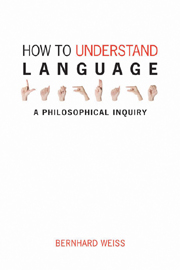
-
The digital format of this book is no longer available to purchase from Cambridge Core. Other formats may be available.
-
Select format
-
- Publisher:
- Acumen Publishing
- Publication date:
- 05 February 2013
- 31 December 2009
- ISBN:
- 9781844654468
- 9781844651962
- 9781844651979
- Dimensions:
- Weight & Pages:
- 00kg,
- Dimensions:
- Weight & Pages:
- 00kg,
- Subjects:
- Philosophy of Mind and Language, Philosophy
You may already have access via personal or institutional login- Subjects:
- Philosophy of Mind and Language, Philosophy
Book description
Why are philosophers - as opposed to, say, linguists and psychologists - puzzled by language? How should we attempt to shed philosophical light on the phenomenon of language? How to Understand Language frames its discussion of the philosophy of language with these two central questions. Bernhard Weiss first explores the reasons why language is so hard to understand from a philosophical point of view and then begins the search for a productive approach to the philosophical task of understanding language. After finding fault with approaches based on philosophical analysis or translation, Weiss undertakes an extended investigation of the programme of constructing a theory of meaning. Weiss endorses Donald Davidsons advocacy of that approach, which is pivotal to the discussion, but he argues strongly against the roles of both truth theory and radical interpretation. In doing so, he offers novel arguments for a number of distinctive claims about some key issues in philosophy of language, centrally, those of the normativity and publicity of meaning. How to Understand Language presents a fresh approach to many issues of abiding interest in the philosophy of language.
Reviews
"Weiss's book cuts deeper than many other books on the general philosophy of language . . . he is far from ensnared by tradition . . . he thinks things through in his own way without paying excessive attention to the authorities. And to follow him on his path through the labyrinth of language in not only very enlightening; it is also a great enjoyment."
Source: Notre Dame Philosophical Reviews
Contents
Metrics
Full text views
Full text views help Loading metrics...
Loading metrics...
* Views captured on Cambridge Core between #date#. This data will be updated every 24 hours.
Usage data cannot currently be displayed.
Accessibility standard: Unknown
Why this information is here
This section outlines the accessibility features of this content - including support for screen readers, full keyboard navigation and high-contrast display options. This may not be relevant for you.
Accessibility Information
Accessibility compliance for the PDF of this book is currently unknown and may be updated in the future.

